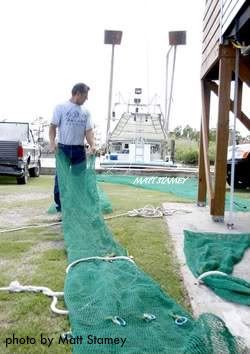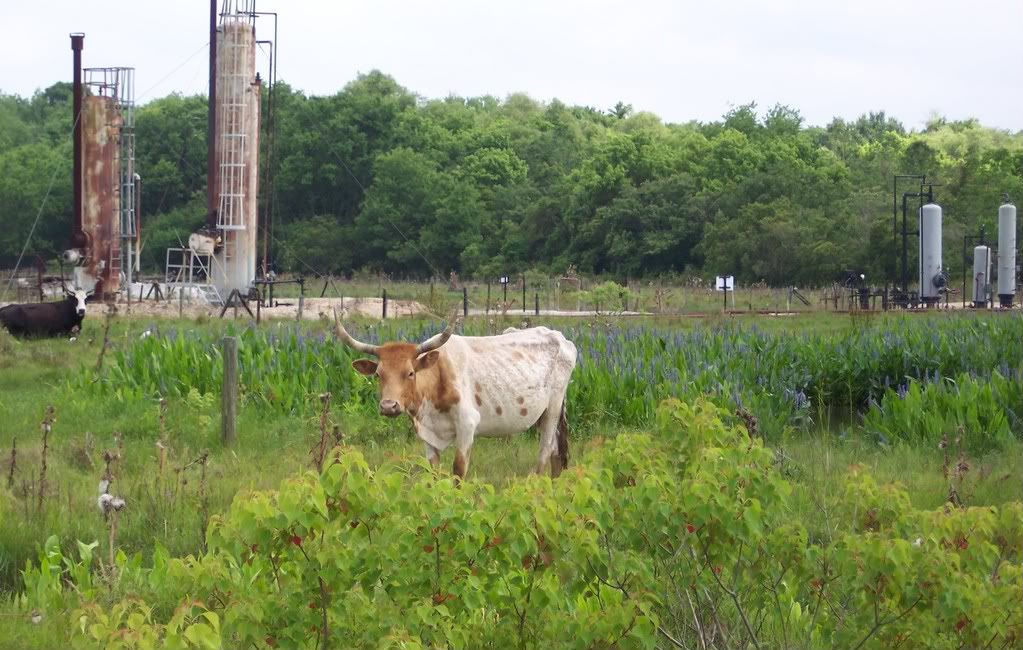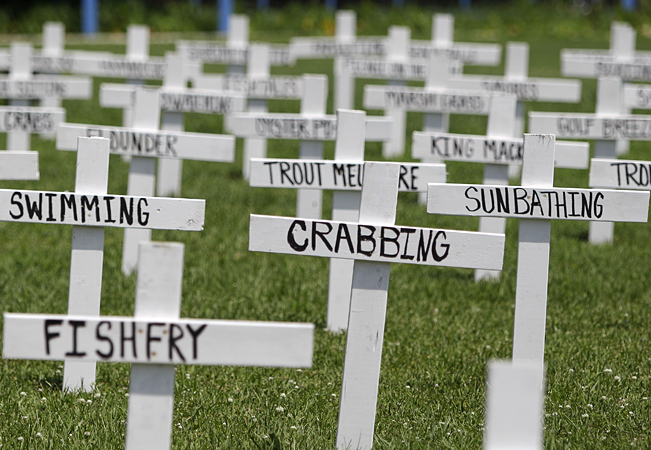Wednesday, June 1, 2011
Hommage à la Louisiane .... Revisited
NWF asked a diverse group of locals in Venice, La what they love about their home state. We then asked them what they feared most about the BP Oil Spill. This was their answers. Music by The Lost Bayou Ramblers.
Update posts will reveal that many of these fears have come true.
Tuesday, May 31, 2011
BP Oil Spill Disaster: An Indigenous Perspective Revisited
Thursday, April 14, 2011
BP BANS CNBC CAMERA CREWS ACCESS TO AGM
Gulf Oil Spill Song inna Reggae Stylee
The Second Angel blew his Trumpet
And something like a great mountain, burning with fire, was thrown into the sea
A third of the sea became blood
A third of the living creatures in the sea died
And a third of the ships were destroyed
Revelation 8 verse 8 and 9
Is this that time?
Chorus
Oh the oil spill
Gulf of Mexico oil spill
Ocean life a die still
While they pointing fingers Mama Earth a cry still
The oil spill
Gulf of Mexico oil spill
What price will
We pay, Mama Earth a cry still
Verse 1
Washing up on a beach near you could it come close
Or change the world temperature or cause famine and drought (huh)
Life from Fort Lauderdale Florida east coast
This is Highah Seekah The Journalis, I am your host
Speaking of Florida, off towards its western coast
Out in the Gulf of Mexico, a disaster grows
On April twenty twenty ten Deepwater Horizon blows
Millions a gallons a oil, into the sea it flows (Damn)
Chorus
Oh the oil spill
Gulf of Mexico oil spill
Ocean life a die still
While they pointing fingers Mama Earth a cry still
The oil spill
Gulf of Mexico oil spill
What price will
The planet pay, Mama Earth a cry still
Verse 2
Crying and she's bleeding as she's never bled
From the wound of an exploded, oil well-head
Will the plants and sea animals, end-up dead
Will the sea become like blood, end-up red
How will this, affect the planet, and the land we living on
The mammals, the fish, the phytoplankton
The cause, corporate commercial exploitation
Effects more environmental damage by man (certain greedy man)
Chorus
Oh the oil spill
Gulf of Mexico oil spill
Ocean life a die still
While they pointing fingers Mama Earth a cry still
The oil spill
Gulf of Mexico oil spill
What price will
We pay, Mama Earth a cry still
Verse 3
Oil reflects sunlight and blocks evaporation
Which stops condensation, less rainfall and precipitation
With less moisture in the air for re-distribution
Big effects on global temperature and food production
And if that loop current takes it to the Atlantic Ocean
And it reaches the beaches of the east coast and
Pollute Wildlife, rivers yow the repercussion
It will be worse than the damn recession (worse)
Chorus
Oh the oil spill
Gulf of Mexico oil spill
Life a die still
While they pointing fingers Mama Earth a cry still
The oil spill
Gulf of Mexico oil spill
What price will
We all pay, Mama Earth a cry still
The oil spill
Gulf of Mexico oil spill
Mama Earth a cry still
DOWNLOAD THE SONG: | http://highahseekah.com
"GULF OF MEXICO OIL SPILL" LYRICS BELOW |
http://soundcloud.com/highahseekah/gulfofmexicooilspill
SONG POSTER: http://tinyurl.com/3yqz8ok
Myspace
http://myspace.com/highahseekah
Twitter http://twitter.com/highahseekah
Facebook Fan-page http://tinyurl.com/28ccd5x
Official Site http://highahseekah.com
http://www.facebook.com/pages/Coastal-Warriors/138042086209818
Friday, January 7, 2011
Louisiana's Culture of Fishermen Ponder Future
 |
| Jennifer Zdon for The New York Times |
By AMY HARMON New York Times
DELACROIX ISLAND, La. — “Hold up, Aaron,” Buddy Greco instructed his son as they bent over a sheet of fiberglass on the docked fishing boat. “You still cuttin’ it wrong.”
His tone on that hot afternoon last June was not unkind. But Aaron, 19, was tired of listening to his father, tired of fixing up the boat for a shrimp season that might never open, tired of wondering whether the future he had set his sights on was dissolving in front of him.
Read Full Story
Monday, December 20, 2010
Top aide to Gov. Bobby Jindal says,..."Oil-impact study may take 20 yrs"
Oil-impact study may take 20 years
But states plan to request money from BP in advance for several recovery projects.
Tuesday, July 13, 2010
Bird's Eye View of Barataria Bay Wetlands
Aerial View of Barataria Bay Area
GULF COAST - Drew Wheelan, ABA Conservation Coordinator, tags along with the Lower Mississippi River and Achafalaya Basin Keepers for a fly over of the Deepwater Horizon Oil Spill and Barataria Bay region of coastal Louisiana. South Wings Aviation provided the flight that gave Drew the opportunity to document a "bird's eye view" of the marsh islands that many species of wildlife call home.
Video recorded on day seventy-four of "The Disaster in the Gulf", just after Hurricane Alex passed through the region. The flight goes over several colonies of birds, including Pelicans, Gulls, Herons and Terns that are being hit hard by the oil and mother nature.
PLEASE NOTE: There was a heavy haze that day but Drew's determination carried him through. Thanks Drew for your dedication to help protect our precious wetlands.
Posted on YOUTUBE by AmericanBirding
Monday, July 12, 2010
Smallest victims of the oil spill face an uncertain future.

Associated Press Writer
FORT JACKSON — The smallest victims are the biggest challenge for crews rescuing birds fouled with oil from the Gulf of Mexico spill.
"There are plenty of oiled babies out there," said Rebecca Dmytryk of the International Bird Rescue Research Center, one of the groups working to clean oiled animals.
The lucky ones end up in a cleaning center at Fort Jackson, a pre-Civil War historic site on the Mississippi River delta south of New Orleans.
Pelican chicks often come in cold because oil has matted down the fluffy down that's meant to keep them warm. They must be warmed quickly just to survive long enough to be cleaned. And the youngest must be taught to eat.
"They only know their parents regurgitating food into their mouths. They don't know how to pick stuff up," said Dmytryk, whose organization is working with Tri-State Bird Rescue, a company hired by BP to coordinate animal rescue and cleaning in Louisiana, Mississippi, Alabama and Florida.
That means tube feeding three times a day. Others, a bit older and accustomed to taking fish from a parent's throat, must be hand-fed until they can eat fish from a bowl.
Adults can be checked a few times a day, but babies needed two staffers' full-time attention to be sure they are eating and are warm.
Many adults and juvenile pelicans get coated with heavy oil diving for fish. That doesn't happen with the chicks, though they may wade into oily puddles or get smeared by oil from their parents' feathers.
In general, rescuers don't go into nesting colonies, said Mike Carloss, a Louisiana Department of Wildlife and Fisheries biologist. He said most rescued chicks were near shorelines or were on nests so low that oil washed onto them.
READ COMPLETE STORYY
Friday, July 9, 2010
Marine Toxicologist Warns Chemicals Could Contaminate Air
Chemicals could contaminate air

JENNA FARMER | TRI-PARISH TIMES
Marine Toxicologist, Dr. Riki Ott urges
residents of the Gulf Coast impacted by
the oil spill to develop at "Plan B."
GULF COAST - It's been 21 years since the Exxon Valdez oil spill, and while many of the financial claims still have yet to be laid to rest, many of the clean-up workers who were exposed to toxic chemicals in 1989, have been.
And with more and more Gulf clean-up workers complaining of headaches, sore throats and nausea, Dr. Riki Ott, marine toxicologist and Exxon Valdez survivor, is getting an unwanted wave of déjà vu.
"We got hard hats instead of respirators, just like you," Dr. Ott recalled. "The material safety data sheet for this oil, it says it's a respiratory irritant. It's all concentrated right where the slick hits the surface, so anything that is on that seawater interface is at risk, like dolphins, sea turtles and the workers in their boats trying to respond to this without respirators."
READ COMPLETE STORY

Thursday, July 8, 2010
Gulf Oysters Replaced By Rhode Island Calamari
McClatchy Newspapers
NEW ORLEANS — Celebrity Chef Frank Brigtsen coated the squid in a perfect blend of seasoned cornmeal then dropped the batch into a vat of oil at Charlie's Seafood, a beloved neighborhood joint.
After a lifetime in Louisiana, 38 years as an architect of Creole cuisine inspired by the gifts of the Gulf of Mexico, this was one of the first times he had served diners fried calamari.
Before BP oil's endless flow threatened the supply and upped price of fish and shellfish by up to 30 percent, a hankering for southern fried seafood at this 60-year-old landmark would have yielded a heaping plate of crispy Louisiana oysters.
"'Charlie's is a place that celebrates Louisiana seafood and here I am frying calamari from Rhode Island," says Brigtsen, an award-winning chef who also owns his eponymously named contemporary Creole cuisine restaurant uptown. "I feel like somehow I am betraying my customers by not giving them oysters. I feel like I am wearing someone else's clothes." READ COMPLETE STORY
Tuesday, July 6, 2010
Louisiana Workforce Commission: Fishermen Job Loss Statistics Unclear
Unemployment Among Fishermen
Difficult to Measure

Rodney Pellegrin works in Dulac, La. to attach two sections of shrimp nets. Pellegrin said he’s frustrated by how the fishing waters are opened and closed so often. | |
HOUMA — Following the auto industry implosion of 2008, Detroit’s unemployment rate stands at nearly 30 percent.
Democracy Now Video "Day 74, Voices From a Devastated Community in the Gulf" "
Day 74 - Democracy Now reporting from the Gulf Coast giving a face to the tragedy now known as the worst oil spill in US history. Amy Goodman, "On this this holiday weekend with families across the country celebrating July 4th, our thoughts are in Louisiana, where we broadcast several weeks ago."
Sunday, July 4, 2010
Fishing Boats Outside Barrier Islands Busy Soaking Up Oil
John DeSantis
Senior Staff Writer
COCODRIE — For the first full day in a week, crews on land and at sea scouted for and cleaned up oil Saturday, making what they said appeared to be solid progress against the Gulf spill in Terrebonne and Lafourche.
“They are heroes,” Lafourche Parish government spokesman Brennan Matherne said of the shrimp boats, which operated around Timbalier Bay and adjacent waters. “I am hearing more and more how impressed the Coast Guard is with our fishermen and their efforts. Had it not been for their hard work and tremendous effort, we would have had much more of an impact.”
Terrebonne Parish, ground crews worked on barrier islands, where large swaths of medium-to-light consistency sheen left its mark on the beaches.
.....
No large patches of oil such as those seen earlier in the week were spotted heading into the barrier island passes.
“There was a big crew working on Timbalier Island today,” said Terrebonne Parish Public Safety Director Ralph Mitchell. READ MORE
Saturday, June 19, 2010
Florida Legal Team Hears Complaints About BP Claims
Florida counties and cities in the path of the Gulf oil spill have not the slightest idea at this point how they could be impacted economically.
Little wonder. Even the state tax collection agency is at a loss, trying to calculate the costs involved in an ever-changing, ever-moving, ever-growing target.
Attorney General Bill McCollum and former attorneys general Bob Butterworth and Jim Smith sought information Tuesday that the state will need to create a process for recouping its losses. The team is gathering information should it seek litigation against BP, which it has not decided to do. The three hoped to come out of the meeting with recommendations about how to refine the claims process.
“We don’t know how long this is going to take,” McCollum told the press before the meeting. “We don’t know the severity of it at the end of the day. What we do know is, we need a process.”
The 26 Florida counties affected need more money and information about the actions the state is taking in compensation for losses from BP, Ginger Delegal, general counsel for the Florida Association of Counties, told the legal team. The claims process has been confusing and lengthy, she said.
Counties have needed to compensate for a change in the claims process that requires them to submit claims directly to BP, instead of submitting them to the state. Two counties have submitted claims this way so far, Delegal said. The change was precipitated by Louisiana parishes that wanted to deal directly with the company. Right now, the counties don’t know if this way works, Delegal said.
Butterworth said state litigation against BP “may be very, very likely,” but the state needs be careful not to get caught in a lengthy legal battle that produces no results.
Smith cautioned claimants not to rush to file lawsuits, as heavy litigation “would get BP to stop working with us.”
READ COMPLETE STORY AT SunshineStateNews.com
Monday, June 14, 2010
THE BUFFALO POST - Gulf Coast Indian tribes – among those hit hardest by BP oil disaster – face aid crisis, too
Gulf Coast Indian tribes – among those hit hardest by BP oil disaster – face aid crisis too
As if an oil spill of historic proportions, one that threatens to end their entire way of life, weren’t bad enough, now comes this news from an Indian Country Today story by Rob Capriccioso that some of the tribes along the Gulf Coast may be ineligible for federal aid:
The Houma Nation is one of several tribes facing an uphill battle. Most tribal citizens in immediate danger are members of state recognized tribes; there are 10 in Louisiana, and four federally recognized ones.
Kendra Barkoff, a spokeswoman for the Department of the Interior, explained that as of June 2, federally recognized tribes seemed to be free of oil complications. She said the agency has received “no reports that federally recognized tribal natural resources are impacted by the spill.” She added that Interior has reached out to all federally recognized tribes in the region, including those from Louisiana, Alabama, Mississippi and Florida.
Shin Inouye, a spokesman for the White House, said tribal leaders have been receiving updates from the White House, and have been invited to participate in update calls with government officials.
State tribes, meanwhile, have been left more to their own devices, with some even trying to work with BP itself to lend a hand.
The BP disaster represents “a dark day for our people,” Brenda Dardar-Robichaux, principal chief of the United Houma Nation,tells Capriccioso. “We’re being hurt economically, environmentally and culturally. … It’s a total assault on who we are, our way of being.”
The 17,000 Houma peole are recognized by the state, and live a mostly subsistence lifestyle – one that they worry will be destroyed for years to come.
“It’s sort of a love/hate relationship we have with the oil companies, as many of our members rely on them for work, but they also see the impact the companies have had on the area over the years. This latest spill makes that impact all the more difficult,” Dardar-Robichaux says.
Adding insult to injury is the fact that oil companies once petitioned the Bureau of Indian Affairs against recognition of the tribe,
Dardar-Robichaux says.
By Gwen Florio


